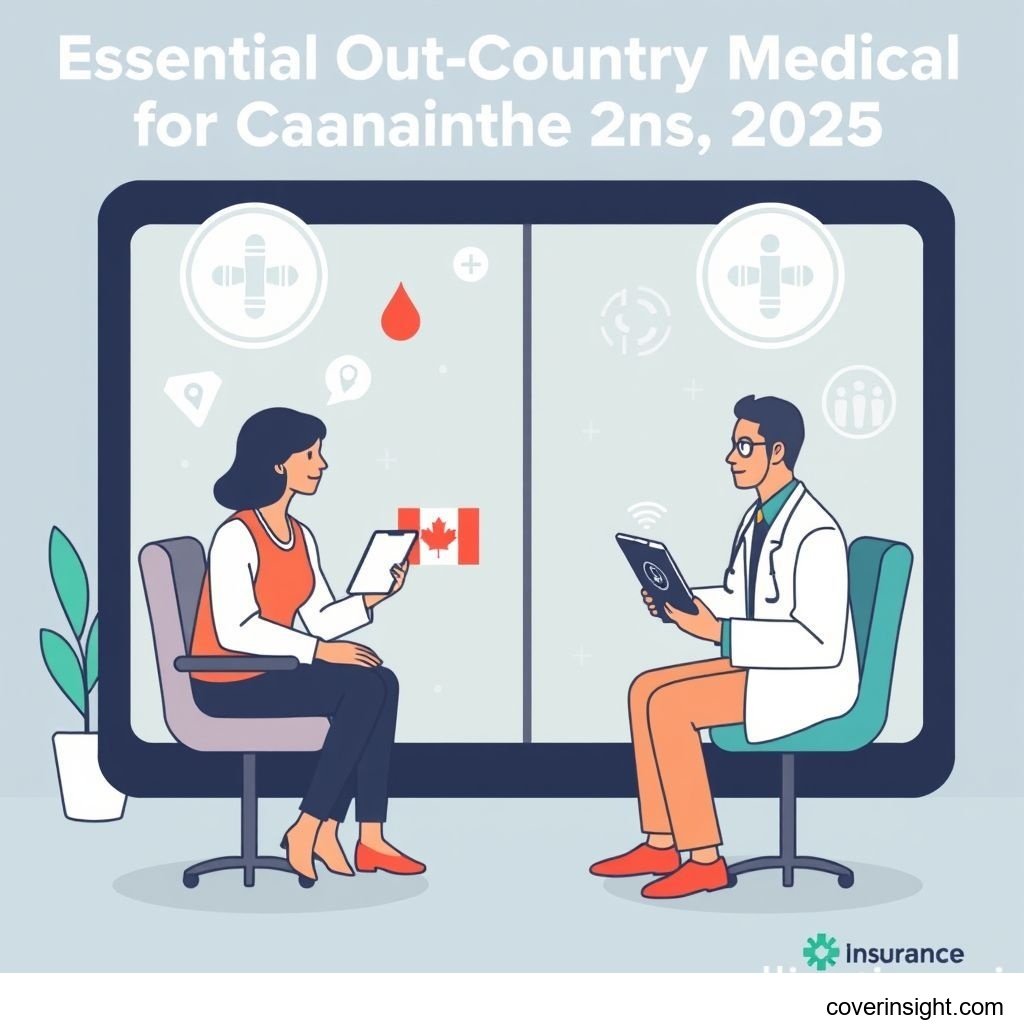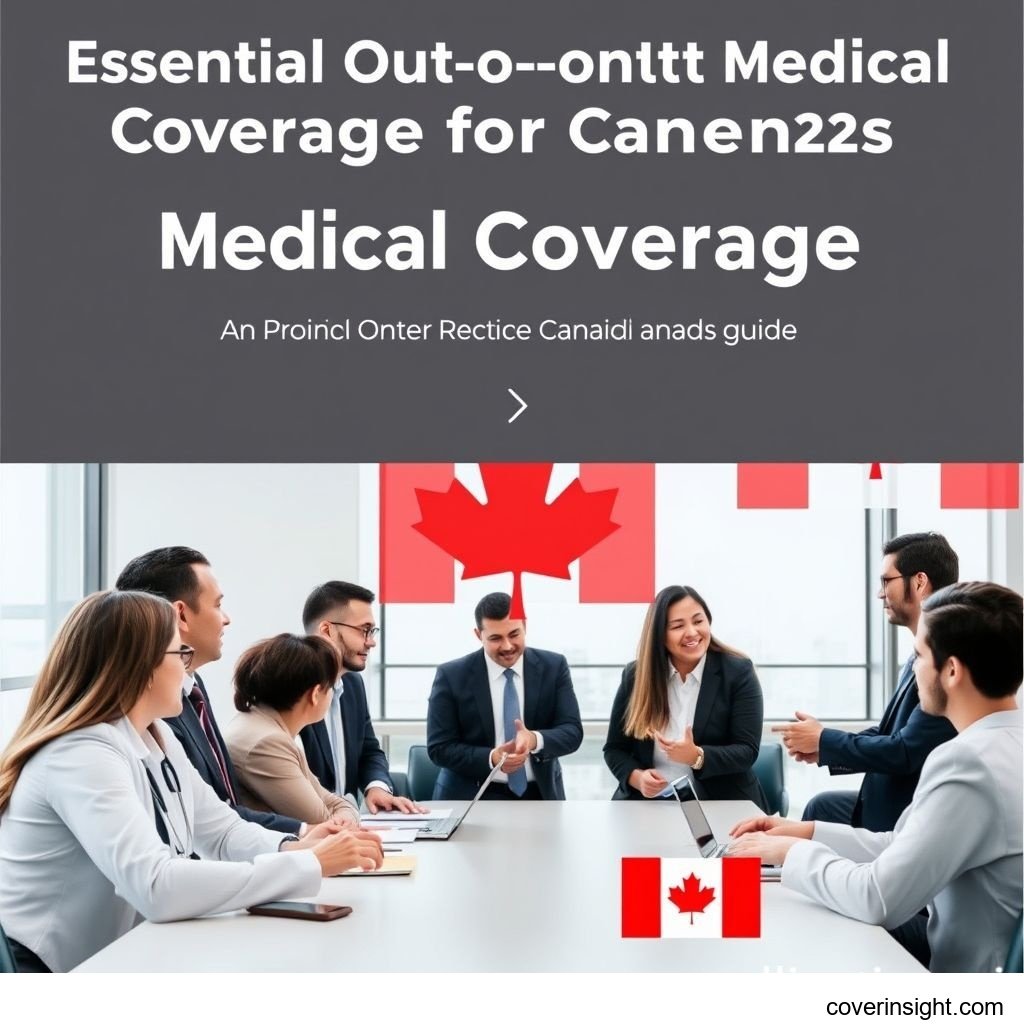Introduction
As businesses in Canada navigate the complexities of employee benefits in 2025, understanding the scope and importance of comprehensive group health insurance becomes paramount. For many Canadian organizations, especially those with employees who travel internationally, securing robust out-of-country medical coverage is not just an added perk but an essential component of a competitive and responsible benefits package. This guide provides an in-depth look at what Canadian employers need to know about integrating crucial out-of-country medical protection into their 2025 group health insurance plans, ensuring peace of mind and financial security for their team, whether at home or abroad.
Coverage Details
Navigating the nuances of group health insurance requires a clear understanding of what’s covered and what isn’t, particularly concerning emergency care outside Canada.
What’s Included in Out-of-Country Medical Coverage
Comprehensive out-of-country medical coverage within a group health insurance plan typically extends beyond basic emergency services, offering a safety net for unexpected health crises while employees are abroad. Key inclusions often feature:
-
Emergency Medical Evacuation: Costs associated with transporting an ill or injured employee to the nearest appropriate medical facility, or back to Canada if medically necessary. This is crucial as international medical transport can cost tens of thousands of dollars.
-
Emergency Hospital and Physician Services: Coverage for inpatient and outpatient hospital stays, consultations with specialists, diagnostic tests (e.g., X-rays, lab work), and emergency room fees.
-
Repatriation of Remains: In the unfortunate event of a fatality, coverage for the preparation and transportation of the deceased’s remains back to Canada.
-
Emergency Dental Services: Pain relief or repair to natural teeth due to an accidental injury while traveling.
-
Prescription Medications: Costs for emergency prescriptions filled while abroad, related to an urgent medical condition.
-
Trip Interruption and Companion Benefits: Some policies offer coverage for travel costs for a family member to join an incapacitated employee, or for costs associated with a sudden return home due to a medical emergency.
-
Travel Assistance Services: Access to a 24/7 hotline for medical referrals, language translation, and other logistical support during an emergency.
It's vital for employers to review the specifics of their chosen group health insurance policy to confirm these inclusions and understand any limitations.
Common Exclusions and Limitations
While robust, out-of-country medical policies do have exclusions designed to manage risk. Common limitations include:
-
Pre-existing Conditions: Often, coverage is limited or excluded for medical conditions that existed before the trip began, especially if they were unstable or required recent treatment. Some plans offer stability clauses, but strict definitions apply.
-
Elective Procedures: Non-emergency treatments, cosmetic surgery, or routine check-ups are not covered.
-
High-Risk Activities: Injuries sustained during adventure sports or activities not listed as covered (e.g., bungee jumping, professional sports) may be excluded.
-
Travel Advisories: Travel to regions with government-issued "avoid non-essential travel" or "avoid all travel" advisories due to war, civil unrest, or pandemics may void coverage.
-
Alcohol or Drug-Related Incidents: Injuries or illnesses resulting from impairment due to alcohol or non-prescribed drug use.
-
Mental Health: While some emergency psychiatric care might be covered, long-term mental health treatment is typically excluded.
-
Routine Pregnancy and Childbirth: Complications of pregnancy may be covered, but routine care or planned childbirth usually is not.
Understanding these exclusions is critical for both employers and employees to prevent unexpected out-of-pocket expenses.
The Importance of Out-of-Country Medical Coverage
For Canadian businesses, especially those with an international footprint or remote employees who travel, robust out-of-country medical coverage is non-negotiable. The costs of international healthcare can be astronomical, potentially bankrupting an individual or placing a significant financial burden on an employer if not adequately covered by group health insurance.
Mitigating Financial Risks Abroad
Without specific out-of-country medical provisions, Canadian provincial health plans offer minimal to no coverage once you leave the country. A simple emergency room visit in the U.S. could cost thousands of dollars, and a serious medical event, such as a heart attack requiring surgery and medical evacuation, could easily exceed $100,000. For businesses, this translates into direct financial risk if they feel compelled to assist an uninsured employee, or significant indirect costs from lost productivity and employee morale if an employee faces a crisis unsupported. Comprehensive group health insurance mitigates these risks, protecting both the employee and the company's bottom line.
Ensuring Employee Well-being and Productivity
Knowing that they are protected against unforeseen medical emergencies abroad significantly boosts employee morale and reduces stress for international travelers. This peace of mind allows employees to focus on their work, whether they are on a business trip, a secondment, or even personal travel, if the policy extends to leisure trips. A supportive group health insurance plan that includes strong out-of-country medical benefits can be a key differentiator in attracting and retaining top talent in a competitive market. Furthermore, quick and effective medical intervention facilitated by good coverage can lead to faster recovery and a quicker return to work, minimizing downtime for the business.
Why It's Essential for Business Travel
Businesses sending employees internationally for conferences, client meetings, or project work have a duty of care. While the primary purpose of travel might be business, emergencies don't discriminate. An employee falling ill or sustaining an injury in a foreign country can be a logistical and financial nightmare. Group health insurance with comprehensive out-of-country medical ensures:
-
Immediate access to necessary medical care without financial hesitation.
-
Coordination of care and communication with medical facilities.
-
Support for the employee's family back home.
-
Compliance with corporate social responsibility (CSR) and potentially, legal obligations in some jurisdictions.
This proactive approach safeguards the company's reputation and demonstrates a strong commitment to employee welfare.
Tailoring Group Health Insurance for Your Team
When selecting group health insurance for your Canadian organization, customization is key. Different workforces have distinct needs, especially regarding age demographics and specific health requirements.
Addressing Diverse Employee Needs
A one-size-fits-all approach to group health insurance often falls short. Consider the demographics of your team:
-
Younger Employees: May prioritize benefits like mental health support, dental coverage, or vision care. Their out-of-country medical needs might focus on adventure travel or backpacking.
-
Families: Will value comprehensive drug coverage, extended health for children, and potentially fertility benefits. Their travel patterns might involve family vacations.
-
Seniors: Employees nearing or in retirement, or those with aging dependents, often require more extensive support for chronic conditions.
-
Remote/Hybrid Workers: Even if not traveling for business, many employees take personal trips abroad, making out-of-country medical coverage a highly valued benefit.
Tailoring your group health insurance to these diverse needs ensures maximum employee engagement and satisfaction.
Incorporating Seniors Drug Coverage
For organizations with an older workforce or those looking to support employees' aging parents, incorporating robust seniors drug coverage into your group health insurance plan is increasingly important. While provincial plans cover some prescription costs, private plans can fill significant gaps, particularly for:
-
High-cost specialty drugs.
-
Drugs not covered by provincial formularies.
-
Reduced deductibles and co-payments.
Offering strong seniors drug coverage demonstrates a commitment to the long-term well-being of your employees and their families, addressing a major financial concern for many older Canadians. This can be a key differentiator in attracting and retaining experienced talent.
Supplemental Benefits to Consider
Beyond core health and out-of-country medical benefits, consider adding supplemental options that enhance your group health insurance package:
-
Paramedical Services: Coverage for chiropractors, physiotherapists, massage therapists, naturopaths, and acupuncturists.
-
Vision Care: Eye exams, glasses, and contact lenses.
-
Dental Care: Basic, major, and orthodontic services.
-
Mental Health Services: Psychologists, social workers, and other counselling services.
-
Health Spending Accounts (HSAs): Provide a set amount of money annually for employees to spend on eligible medical expenses not covered by the plan, offering flexibility.
-
Employee Assistance Programs (EAPs): Confidential counselling and support for various personal and work-related issues.
-
Wellness Programs: Initiatives promoting physical activity, healthy eating, and stress management.
Cost Analysis
Understanding the cost factors and potential savings is crucial when evaluating group health insurance options.
Price Factors for Group Health Insurance
Several variables influence the premiums for your group health insurance plan:
-
Group Size and Demographics:
-
Larger groups often benefit from economies of scale.
-
Age, gender mix, and general health of the employee base play a significant role. Groups with an older workforce or a higher proportion of employees with chronic conditions may see higher premiums, particularly affecting seniors drug coverage costs.
-
-
Coverage Level and Plan Design:
-
The breadth of benefits (e.g., drug coverage, dental, extended health, out-of-country medical limits) directly impacts cost. More comprehensive plans are more expensive.
-
Deductibles, co-insurance, and annual maximums influence risk sharing between the insurer and the plan members. Higher deductibles typically mean lower premiums.
-
-
Claims Experience:
- For existing plans, historical claims data significantly impacts future premiums. A group with high claims in previous years may face increases.
-
Industry and Risk Profile:
- Some industries are considered higher risk due to the nature of the work, which can affect rates.
-
Location:
- While less impactful than individual health insurance, regional healthcare costs can still play a minor role.
-
Insurer and Market Conditions:
- Different insurance providers have varying pricing strategies and administrative costs. Market competition can also influence rates.
Saving Tips for Group Health Insurance
While providing robust benefits, there are ways to manage the cost of your group health insurance:
-
Explore Different Plan Designs: Consider higher deductibles or co-insurance percentages to reduce premiums. Offer a basic plan with options to upgrade, or utilize a Health Spending Account (HSA) to supplement core benefits.
-
Promote Wellness Programs: A healthier workforce leads to fewer claims, potentially stabilizing or lowering future premiums.
-
Regularly Review Your Plan: Don't just auto-renew. Work with a benefits advisor to regularly benchmark your plan against market offerings and analyze your claims data.
-
Educate Employees on Wise Usage: Encourage employees to use generic drugs when available, and understand how to navigate the healthcare system efficiently, especially for out-of-country medical emergencies where pre-authorization might be required.
-
Consider Pooled Benefits: For smaller groups, pooling certain high-cost benefits (like catastrophic drug coverage or out-of-country medical) with other small businesses can help stabilize rates.
-
Negotiate with Providers: Especially for larger groups, there's often room for negotiation on rates or administrative fees.
-
Combine Benefits: Sometimes bundling different types of coverage (e.g., health, dental, disability) with one provider can lead to discounts.
Choosing the Right Group Health Insurance Plan
Selecting the ideal group health insurance plan requires careful consideration, aligning employee needs with budgetary realities.
Steps to Evaluate Providers and Plans
-
Assess Your Needs: Conduct an internal survey or analyze employee demographics to understand what benefits are most valued and needed. This includes specific considerations like the prevalence of international travel among employees and the average age of your workforce to gauge the importance of seniors drug coverage and similar benefits.
-
Define Your Budget: Determine how much your organization can realistically allocate to employee benefits.
-
Work with a Benefits Advisor: An experienced independent advisor can provide invaluable expertise. They can:
-
Help you understand market trends and available products.
-
Negotiate with various insurance providers on your behalf.
-
Analyze complex plan designs and explain the fine print.
-
Assist with compliance and administration.
-
-
Compare Quotes and Coverage: Don't just look at premiums. Compare:
-
Coverage Limits: Ensure benefits like out-of-country medical have adequate maximums.
-
Deductibles and Co-insurance: How much do employees pay out-of-pocket?
-
Drug Formularies: Are the medications your employees use covered?
-
Provider Networks: If applicable, are preferred providers accessible?
-
Customer Service: What is the insurer's reputation for claims processing and support?
-
-
Review the Fine Print: Pay close attention to exclusions, limitations, and waiting periods, particularly for out-of-country medical coverage.
-
Consider Technology and Administration: Does the insurer offer easy-to-use online portals for claims submission and benefit management for both employees and HR?
For additional insights, you can explore resources from the Insurance Bureau of Canada or the Financial Consumer Agency of Canada.
Partnering with a Benefits Advisor
Engaging a qualified benefits advisor is perhaps the most critical step in securing the right group health insurance. They act as an extension of your HR team, offering:
-
Market Expertise: Navigating the complex and ever-changing insurance landscape.
-
Cost Efficiency: Identifying opportunities for savings without compromising essential coverage.
-
Strategic Planning: Helping you design a benefits package that aligns with your company's culture and long-term goals.
-
Ongoing Support: Assisting with annual renewals, claims issues, and employee communication.
A good advisor can transform your benefits program from a cost center into a strategic asset for employee attraction and retention. For comprehensive information and expert guidance on benefits, consider exploring resources like Insurance Resources Global.
FAQs about Group Health Insurance
How much does group health insurance cost?
The cost of group health insurance in Canada varies significantly based on numerous factors including the size of your group, employee demographics (age, gender), the level of coverage chosen (e.g., inclusion of dental, vision, robust out-of-country medical), historical claims experience, and the specific insurer. There's no single answer, but it's crucial to obtain personalized quotes to get an accurate estimate.
What affects premiums for group health insurance?
Premiums are influenced by group size and average age, the generosity of the benefits package (e.g., low deductibles, high maximums for seniors drug coverage), previous claims history, the industry your business operates in, and the specific insurer’s pricing models. Plans with extensive out-of-country medical benefits will typically have higher premiums.
Is it mandatory to offer group health insurance in Canada?
No, offering group health insurance is not legally mandatory for employers in Canada. However, it is a highly valued benefit that helps companies attract and retain talent, enhances employee morale, and ensures the well-being of the workforce. For employees traveling for business, having robust out-of-country medical is a crucial aspect of employer responsibility.
How do I choose the best group health insurance plan for my company?
To choose the best group health insurance plan, you should:
-
Assess your employees' needs and preferences.
-
Define your budget.
-
Work with an experienced benefits advisor who can compare options from multiple insurers.
-
Carefully review coverage details, including limits for out-of-country medical and specifics around seniors drug coverage.
-
Consider the insurer's reputation for service and claims processing. Resources like CA Insurance Home can provide a starting point.
What are the consequences of not having adequate out-of-country medical coverage?
Without adequate out-of-country medical coverage, employees face significant financial risk if they experience a medical emergency abroad. Provincial health plans offer minimal coverage outside Canada. Consequences can include:
-
Tens of thousands or even hundreds of thousands of dollars in medical bills.
-
Difficulty accessing necessary care without upfront payment.
-
Financial hardship for the employee and their family.
-
Potential need for the employer to step in and cover costs, impacting company finances.
-
Increased stress and potential long-term health complications due to delayed treatment.
Investing in comprehensive group health insurance with strong out-of-country medical benefits is a strategic decision for any forward-thinking Canadian business.








Comments